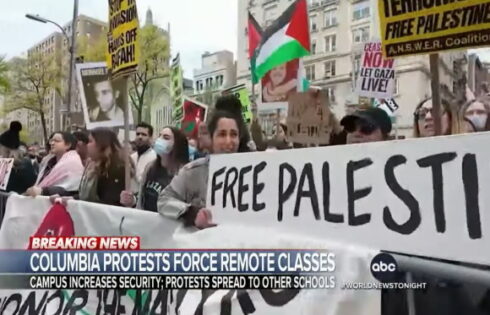
Approved right before Marquette attacked faculty speech rights
When the American Bar Association considered a resolution in favor of implementing a popular campus sexual-consent standard in criminal law, even some of its original supporters backed out, and it failed.
Fortunately for the nation’s preeminent organization of lawyers, which also sets academic standards for law schools, support for robust and freewheeling debate remains strong.
It passed a resolution at its meeting this month that resembles the University of Chicago’s free-speech principles, which have been widely adopted by other universities and faculty bodies.
It’s much shorter, however, and its brevity may explain why it didn’t face crippling opposition from advocates of safe spaces and rules intended to squelch so-called hate speech.
The resolution “urges all private and public universities and colleges” to adopt principles that recognize they “have a responsibility to promote freedom of debate and thought, and to protect that freedom when others attempt to restrict it,” it begins.
MORE: ABA votes down campus sex rules for criminal law
They should not restrict constitutionally protected speech and debate except “as necessary to comply with reasonable administrative rules applied on a content-neutral basis,” it continues, recognizing that even content-neutral rules can be inherently unreasonable.
Finally, it recognizes the threat of shoutdowns, targeted defundings and cancel culture on campus:
Universities and colleges should protect all members of their communities and all speakers on their campuses and other locations from censorship, intimidation or retaliation on the basis of their opinions or beliefs.
The Foundation for Individual Rights in Education cheered the approved resolution, urging campus administrators to approve similar policy statements and revise their speech codes to comply with the First Amendment.
Bans spontaneous demonstrations, possibly in response to union sit-in
One university whose recently revised policies appear to fly in the face of the ABA resolution is Wisconsin’s Marquette, already known for getting struck down in court for violating the contractual rights of faculty.
The Jesuit institution has now banned all spontaneous demonstrations outside of two approved campus locations. The Chronicle of Higher Education reports that it buried the policy change in a multi-subject Aug. 19 email newsletter:
The policy requires that all demonstrations not held in Marquette’s student union or the adjacent green space be approved through a permitting procedure. Students must seek approval from the dean’s office, while faculty and staff members will need to request permission from the provost’s office and the vice president for human resources, respectively.
The administration emphasizes that the change is content-neutral, but it’s harder to argue that requiring advance permission for time-sensitive protests is “reasonable” under the ABA resolution.
The university told the Chronicle that Marquette is simply extending its decades-old “demonstration policy” for students to the entire community, to protect “the safety, security, and well-being of our campus community and visitors to campus.”
It is nothing more than “time, place, and manner” restrictions on demonstrations, Marquette claims, though such restrictions generally don’t require advance permission to use outdoor parts of campus generally open to the community, such as its quad.
MORE: Court tells Marquette it can’t violate faculty contract for PR reasons
Over 100 faculty members signed an open letter that was delivered to Marquette administrators on Tuesday, calling the policy “arbitrary and capricious.” https://t.co/anMamqlx9B
— The Chronicle of Higher Education (@chronicle) August 30, 2019
Some faculty think the private university is trying to stop them from holding a protest similar to the pro-union occupation of Marquette’s administration building for three weeks in May:
During the sit-in, [acting Provost Kimo] Ah Yun told occupiers that they could not block building entrances and exits and would need to obtain permission to stage future demonstrations. Both clauses are included in the demonstration policy introduced this month …
Faculty are not only concerned about the content of the revision but the method by which it was approved. It distinguishes between permitted “peaceful” protests and banned “disruptive” protests but is silent on how to arbitrate the distinction, Prof. Sameena Mulla told the Chronicle.
It was also approved by a policy review committee that focuses on “operational efficiency” rather than academic freedom or speech concerns. The committee includes no faculty, but rather the provost’s chief of staff, heads of human resources and finance, and assistant general counsel.
An open faculty letter characterizes the change as an attack on dissent and “affront to the culture of civic engagement and democratic participation”:
Students don’t need permission to gather for other reasons in the quad (e.g. frisbee). Yet this policy not only makes the quad an area where free speech is prohibited, it also carves out a small area where “free speech” can happen only subject to bureaucratic approval and without electronic amplification. In creating burdensome barriers to participate fully as a member of the university community this policy promotes a complacent mode of civil engagement and punishes students who seek to freely assemble to make their demands heard.
The letter is less persuasive in arguing that disruptive protests – however defined or adjudicated – are necessary to be effective. It opposes language that bans protests that “disrupt the university’s normal functions,” claiming those rules would have silenced civil rights icon Rosa Parks.
FIRE told the Chronicle it was sour on the policy revision for reasons other than its effect on disruptive protests.
Laura Beltz, senior program officer for policy reform, said it will likely inhibit community members from trying to “demonstrate about something that has just happened in the news” in an obvious venue for demonstrations, such as the quad.
She also frowned on a policy provision that warns campus police and administrators reserve the right to “film, photograph, or record” demonstrations. If students know “police officers might be filming you the whole time, that’s bound to be intimidating,” Beltz said.
Read the ABA resolution on FIRE’s blog and Chronicle article about Marquette.
MORE: UW-Madison spells out new rules after disruptive protests
IMAGE: mangostock/Shutterstock
Like The College Fix on Facebook / Follow us on Twitter





Please join the conversation about our stories on Facebook, Twitter, Instagram, Reddit, MeWe, Rumble, Gab, Minds and Gettr.